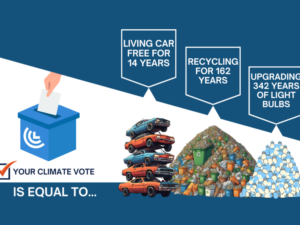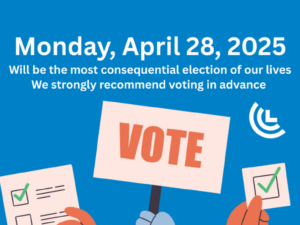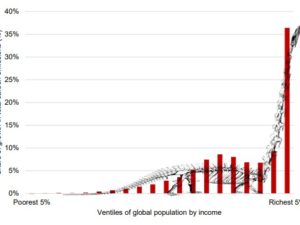If you are not worried about Lyme disease, you should be. In 2010, 143 cases were reported across Canada. In 2016, there were almost 1000 cases. The numbers for 2017, although not yet finalized, are 1479 reported cases of Lyme disease in Canada. In the early 1990s, there was only one known risk area in Ontario, at Long Point Provincial Park. Since then, Ontario has seen an increase and expansion of blacklegged tick populations, particularly in eastern Ontario. There are also pockets in Georgian Bay, Southern Ontario and near Kenora-Rainy River (see map below). Warmer weather is allowing the disease-carrying tick to range ever further northwards. Eggs are laid earlier in the spring, and larvae mature more quickly, giving mature ticks more summer weeks to bite and infect humans. Result: more and more cases. Climate change didn’t cause Lyme disease, but it’s clearly thriving in a warmer Ontario, causing plenty of misery for humans. “It is important for the voters to know about the details of the climate change policies of the various parties. Lyme won’t be the only infectious agent coming our way unless we begin to drastically and rapidly reduce our greenhouse gas emissions, the chief cause of climate change,” says Cathy Orlando, National Director Citizens’ Climate Lobby Canada. On March 5, Citizens’ Climate Lobby sent a survey to the four major political parties in Ontario regarding their climate change policies. As of today, three of the four parties have responded to the survey. Throughout the week, we will be releasing the results of our survey. Here are the answers from the New Democratic Party of Ontario. Which specific carbon pricing policy does your party favour? Please highlight the policy’s major features. What is your party’s position to protecting those most vulnerable from rising commodity prices as the carbon price rises? Does your party agree to end fossil fuel subsidies in Ontario? If so, which ones and by when will your party end these subsidies? What are your party’s GHG targets for 2020 and 2030? Will your party’s carbon price continue to rise past 2022? What is your party’s position on free allocations to industry in the cap and trade program? Industry competitiveness: Carbon pricing policies must be harmonized inter-provincially, territorially, nationally and finally, internationally. Border Tax Adjustments (BTAs) can be implemented by the Federal Government to prevent carbon leakage and protect Canadian industries from countries that currently do not have similar carbon pricing policies.What is your party’s position on the federal government using BTAs especially as the carbon price rises? What is your party’s approach to reducing methane emissions? What is your party’s position on fracking? ######Climate Action Counts for the New Democratic Party of Ontario
FOR IMMEDIATE MEDIA RELEASE: May 16, 2018
Media Contact: Cathy Orlando, cathy@citizensclimatelobby.org , 705-929-4043
The Ontario NDP has publicly supported cap-and-trade for over a decade. We are committed to improving Ontario’s cap-and-trade system to make it more fair, effective and transparent.
The Ontario NDP believes cap-and-trade revenues should 1) assist families and communities facing disproportionate burdens during the transition to a low-carbon economy, such as lower-income, rural and northern communities (the NDP would dedicate at least 25% of cap-and-trade revenues to this purpose), 2) provide for a “just transition” to a low-carbon economy for workers in high-carbon industries, and 3) fund programs to mitigate or adapt to impacts of climate change. During the debate on the cap and trade legislation, we proposed amendments to allow for direct cash rebates to low income, rural and northern families, and would implement such rebates if elected.
The NDP opposes subsidies aimed at encouraging the production of fossil fuels.
The Ontario NDP is committed to meeting Ontario’s greenhouse gas emission reduction targets, and will continue to lower the cap on emissions. The Ontario NDP will review provincial targets to ensure the province can meet Canadian commitments made in the Paris Agreement. MPP Peter Tabuns introduced the Climate Change Mitigation and Low Carbon Economy Amendment Act 2016 which set out these targets. 1. A reduction of at least 15 per cent by the end of 2020. 2. A reduction of at least 45 per cent by the end of 2030. 3. A reduction of at least 80 per cent by the end of 2040.
The Ontario NDP agrees that to be effective and maintain public support, the cap-and-trade system must not include unfair and arbitrary exceptions.
The Ontario NDP shares these concerns about carbon leakage, and strongly agrees that domestic industries should not face unfair disadvantages when competing with industries in jurisdictions that do not put a price on carbon. We would support the federal government’s use of Border Tax Adjustments or other measures to ensure an even playing field for Canadian industries. We would implement cap and trade mechanisms for use as a BTA for Ontario, and proposed such amendments to the cap and trade legislation.
The Ontario NDP supports the use of carbon pricing and regulations to reduce fugitive methane emissions.
The Ontario NDP opposes fracking. NDP MPP Peter Tabuns tabled Bill 82 in 2015 to ban fracking in Ontario.
Media Release: New Democratic Party of Ontario Responds to Climate Action Counts Survey
Home » CCL Canada News » Media Release: New Democratic Party of Ontario Responds to Climate Action Counts Survey
Media Release: New Democratic Party of Ontario Responds to Climate Action Counts Survey
Posted on May 16, 2018 in Media Release













